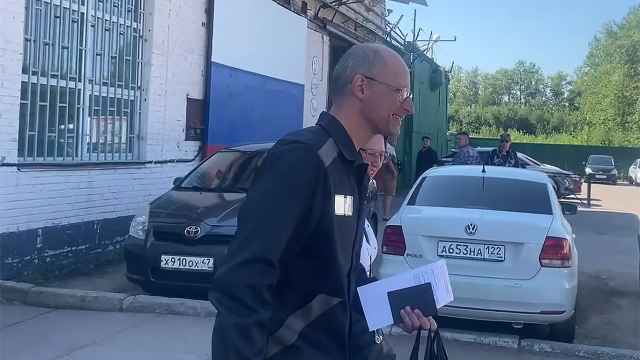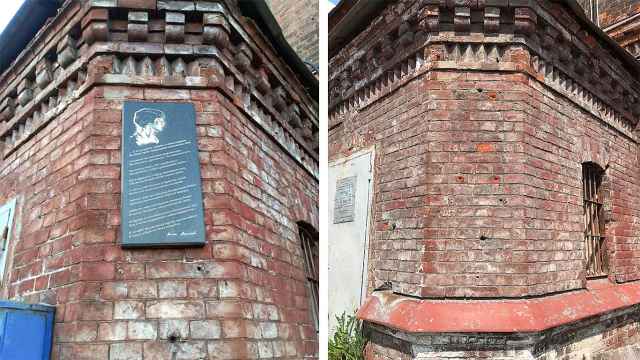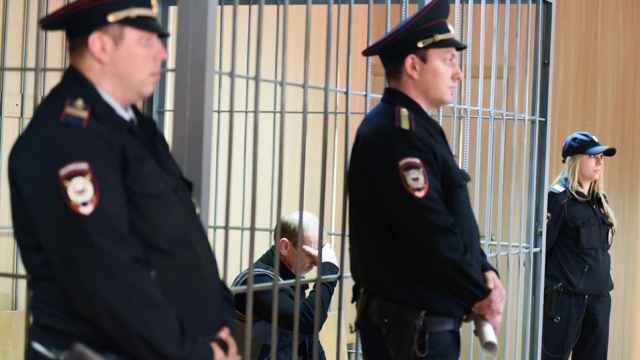St. Petersburg-based media reported Monday that it had uncovered a secret underground prison disguised as a cottage with a human-sized crematory in an abandoned village outside Russia’s second city.
Video shared by the city’s 47news.ru outlet showed two prison cells with bunk beds and toilets in the cottage’s flooded basement. Next to one of the cells, journalists filmed an entry to what appeared to be a second, deeper basement that was inaccessible due to the flooding.
Access to the underground bunker is provided by a garage that can fit vehicles the size of police vans and that descends directly into the basement, according to the footage filmed from the courtyard.
Another video the outlet said it had obtained from investigators showed the wooden cottage and the surrounding property, including a 3-meter corrugated metal fence, before it had fallen into disrepair.
A bathouse behind the cottage was found to have a secret hatch that led to a flooded “furnace the size of a human body.” According to 47news.ru, authorities said expert analysis showed “biological remains” in the furnace but did not indicate whether those were human or animal remains.
The outlet’s video showed a dilapidated wooden structure next to a large pit that had construction materials surrounding it.
47news.ru said its crew visited the bunker after being tipped off about its existence “by some migrant who may have been pilfering the remaining goods but couldn’t keep what he saw to himself.”
Local residents in the Leningrad region village of Agalatovskoye 44 kilometers north of St. Petersburg told the outlet that Russia’s Investigative Committee had “worked” at the site in 2020. Village head Vladimir Sidorenko told another Russian news website, Podyom, that the Investigative Committee had uncovered the secret prison three years ago.
“Until now, nobody wrote or knew about what happened there except for the authorities,” Sidorenko was quoted as saying.
Citing its unnamed sources, 47news.ru said the bunker’s first owner was identified as a former pre-trial detention facility chief who retired in 2004 and died at age 51 in 2018. Its second owner is reportedly a 50-year-old businessman and multiple offender who was first convicted of kidnapping in 2001 and who changed his name to “Escobar” in 2010.
After the discovery gained traction in Russian media and nearby residents traveled to visit it, Podyom reported Monday that the entire facility was bulldozed at the Investigative Committee’s request.
“We don’t comment on that in any way,” the Investigative Committee's spokeswoman told Podyom when asked to explain its presence there in 2018 and 2020.
According to 47news.ru, investigators came to a dead end tracing the origins of the secret underground prison.
A Message from The Moscow Times:
Dear readers,
We are facing unprecedented challenges. Russia's Prosecutor General's Office has designated The Moscow Times as an "undesirable" organization, criminalizing our work and putting our staff at risk of prosecution. This follows our earlier unjust labeling as a "foreign agent."
These actions are direct attempts to silence independent journalism in Russia. The authorities claim our work "discredits the decisions of the Russian leadership." We see things differently: we strive to provide accurate, unbiased reporting on Russia.
We, the journalists of The Moscow Times, refuse to be silenced. But to continue our work, we need your help.
Your support, no matter how small, makes a world of difference. If you can, please support us monthly starting from just $2. It's quick to set up, and every contribution makes a significant impact.
By supporting The Moscow Times, you're defending open, independent journalism in the face of repression. Thank you for standing with us.
Remind me later.






